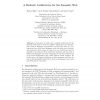Free Online Productivity Tools
i2Speak
i2Symbol
i2OCR
iTex2Img
iWeb2Print
iWeb2Shot
i2Type
iPdf2Split
iPdf2Merge
i2Bopomofo
i2Arabic
i2Style
i2Image
i2PDF
iLatex2Rtf
Sci2ools
109
Voted
RULEML
2005
Springer
2005
Springer
A Realistic Architecture for the Semantic Web
In this paper we argue that a realistic architecture for the Semantic Web must be based on multiple independent, but interoperable, stacks of languages. In particular, we argue that there is a very important class of rule-based languages, with over thirty years of history and experience, which cannot be layered on top of OWL and must be included in the Semantic Web architecture alongside with the stack of OWL-based languages. The class of languages we are after includes rules in the Logic Programming style, which support default negation. We briefly survey the logical foundations of these languages and then discuss an interoperability framework in which such languages can co-exist with OWL and its extensions.
Related Content
| Added | 28 Jun 2010 |
| Updated | 28 Jun 2010 |
| Type | Conference |
| Year | 2005 |
| Where | RULEML |
| Authors | Michael Kifer, Jos de Bruijn, Harold Boley, Dieter Fensel |
Comments (0)

